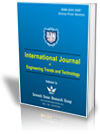Pollution Issues in Iraqi Kurdistan Region
Citation
Hamed M. Jassim , Yousif Abdulla Aziz Kurdi , Fakhri H. Ibraheem Al-nidai. "Pollution Issues in Iraqi Kurdistan Region". International Journal of Engineering Trends and Technology (IJETT). V4(5):2050-2058 May 2013. ISSN:2231-5381. www.ijettjournal.org. published by seventh sense research group.
Abstract
The Kurdistan region in Iraq, and the cities in particular are facing environmental problems such as solid waste management, air pollution, water pollution, pollution due to automobiles, cement industry and oil refineries. There is a certain amount of awareness to the evolving environmental problems in the whole region of Ku rdistan which need a special attention and treatments. This research will be involved in some of the environmental topics facing Kurdistan Region and also gives indications of the causes of the pollutants and extract conclusions and suggests remedies for reducing their impact on the environment. The following categories of environmental issues will be dealt with by performing extensive statistics and studies (qualitatively and quantitatively) in order to draw the relevant conclusions and to make some recom mendations, as outlined below: 1. Pollution due to the increasing numbers of vehicles in the region generally, which indicated an overall increased level of pollution by 13.43 times between 2006 and 2011, which is comparable to the level of increase of traffi c volumes during the same period. This overall increase in the pollution rate can be broken down into the following pollutants: i. Carbon Monoxide ( CO ) quantities have increased by an amount of 12.44 times between 2006 and 2011, whereby the total daily amou nt produced in 2011 was 249.0 tons. ii. Hydrocarbons (HC) quantities have increased by an amount of 12.49 times over the same period, whereby the total daily amount produced in 2011 was 29.49 tons. iii. Nitrogen Oxides (NOx) quantities have increased by an amount o f 12.92 times over the same period, whereby the total daily amount produced in 2011 was 19.76 tons. iv. Mass particulate quantities have increased by an amount of 17.74 times over the same period, whereby the total daily amount produced in 2011 was 2.803 tons. v. Carbon Dioxide (CO2) quantities have increased by an amount of 13.58 times over the same period, whereby the total daily amount produced in 2011 was 4319 tons. 2. Pollution due to increasing cement production, which indicated an overall increased level of po llution by 13.78 times between 2004 and 2010. This is attributed to an increase in cement production by the same proportion during this period. 3. Pollution due to an increase in the capacities of oil refining, which indicated an overall increased level of po llution by 37 times between 2007 and 2013, due to an increase in the oil refining capacities by the same amount over that period
References
[1] Katja Schumacher and Jayant Sathaye, Environmental Energy Technologies Division, U.S. Department of Energy, “ India’s Cement Industry: Productivity, Energy Efficiency & Carbon Emissions “ , July 1999.
[5] C EMBUREAU, Long term emission values from European cement kilns, 1999.
[6] Aybars Co. , Kar Co. , Seyhan Co. , “ Environmental Protection & Pollution Control Measures “ , Report, July 2010.
[7] John Lee, Oil & Gas Comments, Ministry of Natural Resources W eb Site, 9.8.2012.
[8] Alan 131210, Oil Refineries in Kurdistan, Oil & Gas Comments, Ministry of Natural Resources Web Site, 26.5.2012.
[9] ATM, Environmental Challenges Overview Facing the Petroleum Industry.
[10] William Kovarik, Ethyl - leaded Gasoline, Int. J. Occup. Environmental Health, ( pp. 384 – 397 ), 2005.
[11] N. N. Basak, Environmental Engineering, Fourth Reprint by Tata McGrawhill, New Delhi, 2007.
[12] Michael Allaby, Basics of Environmental Science, 2 nd . Edition, Published by Taylor & Francis, New York, 2002.
[13] Nemerow Nelson L. /Agardy Franklin J. /Salvato Joseph A. , Environmental Engineering, Water, Wastewater, Soil and Groundwater Treatment and Remediation, Wiley Vch. , Hardcover, Germany, 2009.
[14] Kriton Curi, Editor, Appropriate Waste Management for Developing Countries, Plenum Press, New York, 1985.
[15] M. B. Pescod, Editor, Urban Solid Waste Management, Published on behalf of the World Health Organization by IRIS, 1991
Keywords
Pollutants, emission, environment, solid waste, air pollution, dust emission, carbon monoxide, carbon dioxide, nitr ogen oxides, hydrocarbons, mass particulate .



